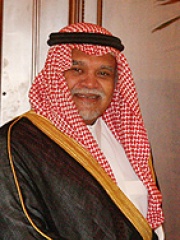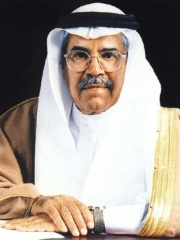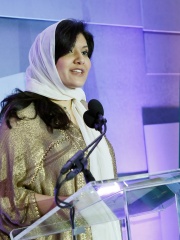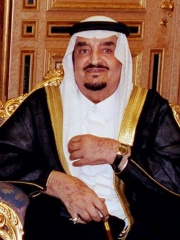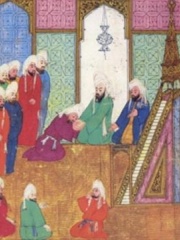

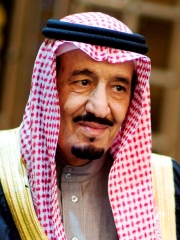


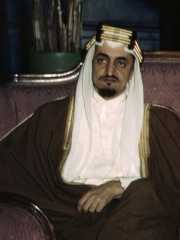
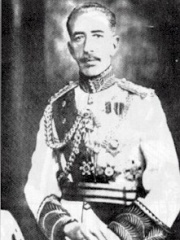
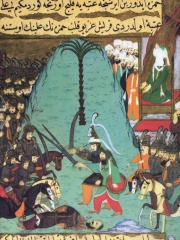
The Most Famous
POLITICIANS from Saudi Arabia
This page contains a list of the greatest Saudi Arabian Politicians. The pantheon dataset contains 19,576 Politicians, 69 of which were born in Saudi Arabia. This makes Saudi Arabia the birth place of the 48th most number of Politicians behind Slovakia, and Ireland.
Top 10
The following people are considered by Pantheon to be the top 10 most legendary Saudi Arabian Politicians of all time. This list of famous Saudi Arabian Politicians is sorted by HPI (Historical Popularity Index), a metric that aggregates information on a biography's online popularity. Visit the rankings page to view the entire list of Saudi Arabian Politicians.

1. Umar (585 - 644)
With an HPI of 89.27, Umar is the most famous Saudi Arabian Politician. His biography has been translated into 135 different languages on wikipedia.
Umar ibn al-Khattab (Arabic: عُمَر بْن ٱلْخَطَّاب, romanized: ʿUmar ibn al-Khaṭṭāb; c. 584 – 644), also spelled Omar, was the second Rashidun caliph, ruling from August 634 until his assassination in 644. He succeeded Abu Bakr (r. 632–634) and is regarded as a senior companion and father-in-law of the Islamic prophet Muhammad. Initially, Umar opposed Muhammad, who was his distant Qurayshite kinsman. However, after converting to Islam in 616, he became the first Muslim to openly pray at the Kaaba. He participated in nearly all of Muhammad’s battles and expeditions, and Muhammad conferred upon him the title al-Fārūq ("the Distinguisher") for his sound judgement. After Muhammad’s death in June 632, Umar pledged allegiance to Abu Bakr as the first caliph and served as his chief adviser. In 634, shortly before his death, Abu Bakr nominated Umar as his successor. During Umar’s reign, the caliphate expanded at an unprecedented rate, conquering the Sasanian Empire and more than two-thirds of the Byzantine Empire. His campaigns against the Sasanians resulted in the conquest of Persia within two years (642–644). According to Jewish tradition, Umar lifted the Christian ban on Jews entering Jerusalem and permitted them to worship there. Umar was assassinated by the Persian slave Abu Lu'lu'a Firuz in 644. Umar is widely credited with expanding the Islamic world beyond Arabia and introducing the Hijri Calendar. Historians generally regard him as one of the most powerful and influential Muslim caliphs in history. In Sunni Islamic tradition, he is revered as a just ruler and a paragon of Islamic virtues, with some hadiths identifying him as the second greatest of the Sahabah after Abu Bakr. In Twelver Shia tradition, however, he is viewed negatively.

2. Uthman (574 - 656)
With an HPI of 84.34, Uthman is the 2nd most famous Saudi Arabian Politician. His biography has been translated into 96 different languages.
Uthman ibn Affan (Arabic: عُثْمَان بْن عَفَّان, romanized: ʿUthmān ibn ʿAffān) (c. 573 or 576 – 17 June 656) was the third caliph of the Rashidun Caliphate, ruling from 644 until his assassination in 656. Uthman, a second cousin, son-in-law, and senior companion of the Islamic prophet Muhammad, played a major role in early Islamic history. During his reign as caliph, he was known for ordering the official compilation of the standardized version of the Quran, known as Uthman's Quran, which is still used today. Before his predecessor, caliph Umar (r. 634–644) died in office, he appointed a committee of trustees to elect a successor. Uthman, who was then aged 68–71 years, was elected to succeed him and became the oldest person to hold such a high position. During his reign, the Caliphate expanded further into Persia and reached as far as the provinces of Khorasan and Transoxiana in the East as well as Ifriqiya and the Iberian Peninsula in the West. Uthman instituted centralized reforms in order to create a more cohesive administrative structure and fostered rapid economic growth. However, the last years of his reign were marked by discontent that eventually evolved into an armed revolt, leading to a siege upon his residence and ultimately culminating in his assassination. Sunni Muslim tradition considers him the third rightly-guided caliph.

3. Salman of Saudi Arabia (b. 1935)
With an HPI of 83.36, Salman of Saudi Arabia is the 3rd most famous Saudi Arabian Politician. His biography has been translated into 95 different languages.
Salman bin Abdulaziz Al Saud (Arabic: سلمان بن عبد العزيز آل سعود; born 31 December 1935) is the King of Saudi Arabia, a position he has held since 2015. He was also Prime Minister of Saudi Arabia from 2015 to 2022. He is the 25th son of King Abdulaziz, the founder of Saudi Arabia. He assumed the throne on 23 January 2015. Prior to his accession, he was Crown Prince of Saudi Arabia from 18 June 2012 to 23 January 2015. Salman is the third oldest living head of state, the oldest living monarch, and Saudi Arabia's first head of state born after the unification of Saudi Arabia. He has a reported personal wealth of at least US$18 billion, which makes him the third wealthiest royal in the world. Salman is a son of King Abdulaziz and Hassa bint Ahmed Al Sudairi, making him one of the Sudairi Seven. He was the deputy governor of Riyadh and later the governor of Riyadh for 48 years from 1963 to 2011. He was then appointed minister of defense. He was named crown prince in 2012. Salman became king in 2015 upon the death of his half-brother, King Abdullah. Salman's major initiatives as king include the Saudi intervention in the Yemeni Civil War, Saudi Vision 2030, and a 2017 decree allowing Saudi women to drive. His seventh son, Crown Prince Mohammed bin Salman, is considered the de facto ruler of Saudi Arabia due to the King's poor health and Mohammed's own political maneuvering. Mohammed replaced his father as prime minister in 2022, making Salman the first king since Saud in 1964 not to serve as head of government.

4. Muawiyah I (603 - 680)
With an HPI of 80.40, Muawiyah I is the 4th most famous Saudi Arabian Politician. His biography has been translated into 79 different languages.
Mu'awiya I (c. 597, 603 or 605–April 680) was the founder and first caliph of the Umayyad Caliphate, ruling from 661 until his death. He became caliph less than thirty years after the death of the Islamic prophet Muhammad and immediately after the four Rashidun ('rightly-guided') caliphs. Unlike his predecessors, who had been close, early companions of Muhammad, Mu'awiya was a relatively late follower of Muhammad. Mu'awiya and his father Abu Sufyan had opposed Muhammad, their distant Qurayshite kinsman and later Mu'awiya's brother-in-law, until Muhammad captured Mecca in 630. Afterward, Mu'awiya became one of Muhammad's scribes. He was appointed by Caliph Abu Bakr (r. 632–634) as a deputy commander in the conquest of Syria. He moved up the ranks through Umar's caliphate (r. 634–644) until becoming governor of Syria during the reign of his Umayyad kinsman, Caliph Uthman (r. 644–656). He allied with the province's powerful Banu Kalb tribe, developed the defenses of its coastal cities, and directed the war effort against the Byzantine Empire, including the first Muslim naval campaigns. In response to Uthman's assassination in 656, Mu'awiya took up the cause of avenging the murdered caliph and opposed the election of Ali. During the First Fitna, the two led their armies to a stalemate at the Battle of Siffin in 657, prompting an abortive series of arbitration talks to settle the dispute. Afterward, Mu'awiya gained recognition as caliph by his Syrian supporters and his ally Amr ibn al-As, who conquered Egypt from Ali's governor in 658. Following the assassination of Ali in 661, Mu'awiya compelled Ali's son and successor Hasan to abdicate and Mu'awiya's suzerainty was acknowledged throughout the Caliphate. Domestically, Mu'awiya relied on Syria's loyalist Arab tribes and largely Christian bureaucracy. He is credited with establishing government departments responsible for the postal route, correspondence, and chancellery. He was the first caliph whose name appeared on coins, inscriptions, or documents of the nascent Islamic empire. Externally, he engaged his troops in almost yearly land and sea raids against the Byzantines, including a failed siege of Constantinople. In Iraq and the eastern provinces, he delegated authority to the powerful governors al-Mughira and Ziyad ibn Abihi, the latter of whom he controversially adopted as his brother. Under Mu'awiya's direction, the Muslim conquest of Ifriqiya (central North Africa) was launched by the commander Uqba ibn Nafi in 670, while the conquests in Khurasan and Sijistan on the eastern frontier were resumed. Although Mu'awiya confined the influence of his Umayyad clan to the governorship of Medina, he nominated his own son, Yazid I, as his successor. It was an unprecedented move in Islamic politics and opposition to it by prominent Muslim leaders, including Ali's son Husayn, and Abd Allah ibn al-Zubayr, persisted after Mu'awiya's death, culminating with the outbreak of the Second Fitna. While there is considerable admiration for Mu'awiya in the contemporary sources, he has been criticized for lacking the justice and piety of the Rashidun and transforming the office of the caliphate into a kingship. Besides these criticisms, Sunni Muslim tradition honors him as a companion of Muhammad and a scribe of Qur'anic revelation. In Shia Islam, Mu'awiya is reviled for opposing Ali, accused of poisoning his son Hasan, and held to have accepted Islam without conviction.
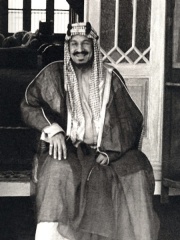
5. Ibn Saud (1875 - 1953)
With an HPI of 79.58, Ibn Saud is the 5th most famous Saudi Arabian Politician. His biography has been translated into 84 different languages.
Abdulaziz bin Abdul Rahman Al Saud (Arabic: عبد العزيز بن عبد الرحمن آل سعود; 15 January 1876 – 9 November 1953), known in the Western world as Ibn Saud (Arabic: ابن سعود; Ibn Suʿūd), was a Najdi statesman and tribal leader who became the founder and first king of Saudi Arabia, reigning from 23 September 1932 until his death in 1953. He had ruled parts of the kingdom since 1902, having previously been Emir, Sultan, King of Nejd, and King of Hejaz. Ibn Saud was the son of Abdul Rahman bin Faisal, Emir of Nejd, and Sara bint Ahmed Al Sudairi. The family were exiled from their residence in the city of Riyadh in 1890. Ibn Saud reconquered Riyadh in 1902, starting three decades of conquests that made him the ruler of nearly all of central and north Arabia. He consolidated his control over Najd in 1921, then conquered the Hejaz in 1925. He extended his dominions into what later became the Kingdom of Saudi Arabia in 1932. Ibn Saud's victory and his support for Islamic revivalists would greatly bolster pan-Islamism across the Islamic world. Concording with Wahhabi beliefs, he ordered the demolition of several shrines, the Al-Baqi Cemetery and the Jannat al-Mu'alla. As King, he presided over the discovery of petroleum in Saudi Arabia in 1938 and the beginning of large-scale oil production after World War II. He fathered many children, including 45 sons, and all of the subsequent kings of Saudi Arabia as of 2025.

6. Abdullah of Saudi Arabia (1924 - 2015)
With an HPI of 79.06, Abdullah of Saudi Arabia is the 6th most famous Saudi Arabian Politician. His biography has been translated into 96 different languages.
Abdullah bin Abdulaziz Al Saud (1 August 1924 – 23 January 2015) was King and Prime Minister of Saudi Arabia from 1 August 2005 until his death in 2015. Prior to his accession, he was Crown Prince of Saudi Arabia from 13 June 1982. He was the tenth son of King Abdulaziz, the founder of Saudi Arabia. Abdullah was the son of King Abdulaziz and Fahda bint Asi Al Shuraim. His mother was a member of the Al Rashid dynasty, historical rivals of the Al Saud dynasty. Abdullah held important political posts throughout most of his adult life. In 1961 he became mayor of Mecca, his first public office. The following year, he was appointed commander of the Saudi Arabian National Guard, a post he was still holding when he became king. He also served as deputy defense minister and was named crown prince when his half-brother Fahd took the throne in 1982. After King Fahd suffered a serious stroke in 1995, Abdullah became the de facto ruler of Saudi Arabia until ascending the throne a decade later. During his reign, Abdullah maintained close relations with the United States and the United Kingdom and bought billions of dollars' worth of defense equipment from both states. Abdullah maintained the status quo when there were waves of protest in the kingdom during the Arab Spring. He held four of his daughters, which he fathered with Al Anoud Al Fayez whom he married when she was age 15, captive against their will. The three crown princes during Abdullah's reign were among the full brothers of King Fahd. Upon becoming king in 2005, Abdullah appointed his half-brother Sultan bin Abdulaziz as crown prince. When Sultan died in 2011, Sultan's full brother Nayef was named heir to the throne, but Nayef himself died the next year. Abdullah then named Salman bin Abdulaziz as crown prince. According to various reports, Abdullah married up to 30 times and had more than 35 children. He was among the wealthiest royals in the world. Upon his death in 2015 at age 90, he was succeeded as King by his half-brother Salman, although Crown Prince Mohammed bin Salman would become de facto ruler of Saudi Arabia.

7. Faisal of Saudi Arabia (1906 - 1975)
With an HPI of 78.51, Faisal of Saudi Arabia is the 7th most famous Saudi Arabian Politician. His biography has been translated into 73 different languages.
Faisal bin Abdulaziz Al Saud (14 April 1906 – 25 March 1975) was King of Saudi Arabia from 1964 until his assassination in 1975. Before his ascension, he served as Crown Prince of Saudi Arabia from 1953 to 1964, and he was briefly regent to his half-brother King Saud in 1964. He was prime minister from 1954 to 1960 and from 1962 to 1975. Faisal was the third son of King Abdulaziz, the founder of modern Saudi Arabia. Faisal was born in Riyadh to Abdulaziz, then Emir of Nejd, and Tarfa bint Abdullah Al Sheikh. Faisal's mother was from the Al ash-Sheikh family, which has produced many prominent Saudi religious leaders. Faisal emerged as an influential political figure during his father's reign. He served as viceroy of Hejaz from 1926 to 1932. He was the Saudi foreign minister from 1930 and prime minister from 1954 until his death, except for a two-year break in both positions from 1960 to 1962. After his father died in 1953 and his half-brother Saud became king, Faisal became crown prince, and in that position he outlawed slavery in Saudi Arabia. He persuaded King Saud to abdicate in his favour in 1964 with the help of other members of the royal family and his maternal cousin Muhammad ibn Ibrahim Al ash-Sheikh, Grand Mufti of Saudi Arabia. Faisal implemented a policy of modernization and reform. His main foreign policy themes were pan-Islamism, anti-communism, and pro-Palestinianism. He attempted to limit the power of Islamic religious officials. Protesting against support that Israel received from the West, he led the oil embargo which caused the 1973 oil crisis. Faisal successfully stabilized the Kingdom's bureaucracy, and his reign had significant popularity among Saudi Arabians despite his reforms facing some controversy. Following his assassination by his nephew Faisal bin Musaid in 1975, he was succeeded by his half-brother Khalid.

8. Faisal I of Iraq (1885 - 1933)
With an HPI of 77.93, Faisal I of Iraq is the 8th most famous Saudi Arabian Politician. His biography has been translated into 61 different languages.
Faisal I bin Hussein bin Ali al-Hashimi (Arabic: فيصل بن حسين بن علي الهاشمي, romanized: Fayṣal bin Ḥusayn bin ʻAlī al-Hāshimī; 20 May 1885 – 8 September 1933) was a Hejazi statesman who served as the King of Iraq from 23 August 1921 until his death in 1933. A member of the Hashemite family, he was a leader of the Great Arab Revolt during the First World War, and ruled as the unrecognized King of the Arab Kingdom of Syria from March to July 1920 when he was expelled by the French. The third son of Hussein bin Ali, the Grand Emir and Sharif of Mecca, Faisal was born in Mecca and raised in Istanbul. From 1916 to 1918, with British assistance, he played a major role in the revolt against the Ottoman Empire. He helped set up an Arab government in Syria, based in Damascus, and led the Arab delegation at the Paris Peace Conference in 1919. In 1920, the Syrian National Congress proclaimed Faisal king, rejecting the French claim to a Mandate for Syria. In response, France invaded a few months later, abolished the kingdom and forced him into exile. In August 1921, in accordance with the decision made at the Cairo Conference, the British arranged for Faisal to become king of a new Kingdom of Iraq under British administration. During his reign, Faisal fostered unity between Sunni Muslims and Shia Muslims to encourage common loyalty and promote pan-Arabism in the goal of creating an Arab state that would include Iraq, Syria and the rest of the Fertile Crescent. In 1932, he presided over the independence of the Kingdom of Iraq upon the end of the British Mandate and the country's entry into the League of Nations. Faisal died of a heart attack in 1933 in Bern, Switzerland, at the age of 48 and was succeeded by his eldest son Ghazi.

9. Hamza ibn Abdul-Muttalib (570 - 625)
With an HPI of 77.55, Hamza ibn Abdul-Muttalib is the 9th most famous Saudi Arabian Politician. His biography has been translated into 41 different languages.
Hamza ibn Abd al-Muttalib ibn Hasim ibn Abd Manaf al-Qurayshi (Arabic: حَمْزَة إبْن عَبْد ٱلْمُطَّلِب, romanized: Ḥamza ibn ʿAbd al-Muṭṭalib; c. 568–625) was a foster brother, paternal uncle, maternal second-cousin, and companion of the Islamic prophet Muhammad. Hamza embraced Islam around 616 CE following an altercation with Abu Jahl and soon became one of Muhammad’s strongest supporters. He took part in early expeditions, notably fighting at the Battle of Badr, and was killed in the Battle of Uhud in 625 CE. His death was widely mourned, and Islamic tradition honors him as Asadullah (lit. 'Lion of God') and the "leader of the martyrs".
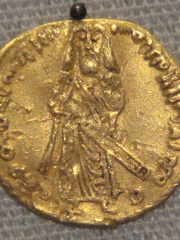
10. Abd al-Malik ibn Marwan (646 - 705)
With an HPI of 77.44, Abd al-Malik ibn Marwan is the 10th most famous Saudi Arabian Politician. His biography has been translated into 67 different languages.
Abd al-Malik ibn Marwan ibn al-Hakam (July/August 644 or June/July 647 – 9 October 705), was the fifth Umayyad caliph, ruling from April 685 until his death in October 705. A member of the first generation of born Muslims, his early life in Medina was occupied with religious pursuits. He held administrative and military posts under Caliph Mu'awiya I (r. 661–680), founder of the Umayyad Caliphate, and his own father, Caliph Marwan I (r. 684–685). By the time of Abd al-Malik's accession, Umayyad authority had collapsed across the Caliphate as a result of the Second Fitna and had been reconstituted in Syria and Egypt during his father's reign. Following a failed invasion of Iraq in 686, Abd al-Malik focused on securing Syria before making further attempts to conquer the greater part of the Caliphate from his principal rival, the Mecca-based caliph Abd Allah ibn al-Zubayr. To that end, he concluded an unfavorable truce with the reinvigorated Byzantine Empire in 689, quashed a coup attempt in Damascus by his kinsman, al-Ashdaq, the following year, and reincorporated into the army the rebellious Qaysi tribes of the Jazira (Upper Mesopotamia) in 691. He then conquered Zubayrid Iraq and dispatched his general, al-Hajjaj ibn Yusuf, to Mecca where he killed Ibn al-Zubayr in late 692, thereby reuniting the Caliphate under Abd al-Malik's rule. The war with Byzantium resumed, resulting in Umayyad advances into Anatolia and Armenia, the destruction of Carthage and the recapture of Kairouan, the launchpad for the later conquests of western North Africa and the Iberian Peninsula, in 698. In the east, al-Hajjaj had become Abd al-Malik's viceroy and firmly established the caliph's authority in Iraq and Khurasan, stamping out opposition by the Kharijites and the Arab tribal nobility by 702. Abd al-Malik's final years were marked by a domestically peaceful and prosperous consolidation of power. Abd al-Malik's most consequential reforms were the introduction of a single Islamic currency in place of Byzantine and Sasanian coinage and the establishment of Arabic as the language of the bureaucracy in place of Greek and Persian in Syria and Iraq, respectively. His Muslim upbringing, the conflicts with external and local Christian forces and rival claimants to Islamic leadership all influenced Abd al-Malik's efforts to prescribe a distinctly Islamic character to the Umayyad state. This also manifested with his founding of the Dome of the Rock in Jerusalem, the earliest archaeologically-attested religious monument built by a Muslim ruler and the possessor of the earliest inscriptions proclaiming Islam and the prophet Muhammad. In a significant departure from his predecessors, rule over the Caliphate's provinces was centralized under Abd al-Malik. He used loyalist Arab troops from Syria to control the provinces, reducing the reliance on local Arab garrisons. Tax surpluses from the provinces were forwarded to Damascus and the traditional stipends to veterans of the early Muslim conquests and their descendants were abolished, salaries being restricted to those in active service. The foundations established by Abd al-Malik enabled his son and successor, al-Walid I (r. 705–715), who largely maintained his father's policies, to oversee the Umayyad Caliphate's territorial and economic zenith. Abd al-Malik's centralized government became the prototype for the administrations of later medieval Muslim states.
People
Pantheon has 69 people classified as Saudi Arabian politicians born between 200 and 1985. Of these 69, 11 (15.94%) of them are still alive today. The most famous living Saudi Arabian politicians include Salman of Saudi Arabia, Mohammad bin Salman, and Muhammad bin Nayef. The most famous deceased Saudi Arabian politicians include Umar, Uthman, and Muawiyah I.
Living Saudi Arabian Politicians
Go to all RankingsSalman of Saudi Arabia
1935 - Present
HPI: 83.36
Mohammad bin Salman
1985 - Present
HPI: 68.83
Muhammad bin Nayef
1959 - Present
HPI: 66.31
Muqrin bin Abdulaziz
1945 - Present
HPI: 65.65
Sultan bin Salman Al Saud
1956 - Present
HPI: 63.45
Abdul Rahman Al-Sudais
1960 - Present
HPI: 63.34
Saad Hariri
1970 - Present
HPI: 61.12
Bandar bin Sultan Al Saud
1949 - Present
HPI: 59.11
Ali Al-Naimi
1935 - Present
HPI: 55.55
Adel al-Jubeir
1962 - Present
HPI: 54.05
Reema bint Bandar Al Saud
1975 - Present
HPI: 47.79
Deceased Saudi Arabian Politicians
Go to all RankingsUmar
585 - 644
HPI: 89.27
Uthman
574 - 656
HPI: 84.34
Muawiyah I
603 - 680
HPI: 80.40
Ibn Saud
1875 - 1953
HPI: 79.58
Abdullah of Saudi Arabia
1924 - 2015
HPI: 79.06
Faisal of Saudi Arabia
1906 - 1975
HPI: 78.51
Faisal I of Iraq
1885 - 1933
HPI: 77.93
Hamza ibn Abdul-Muttalib
570 - 625
HPI: 77.55
Abd al-Malik ibn Marwan
646 - 705
HPI: 77.44
Abū Lahab
549 - 624
HPI: 77.13
Abu Sufyan ibn Harb
580 - 641
HPI: 76.78
Fahd of Saudi Arabia
1921 - 2005
HPI: 76.14
Overlapping Lives
Which Politicians were alive at the same time? This visualization shows the lifespans of the 22 most globally memorable Politicians since 1700.







